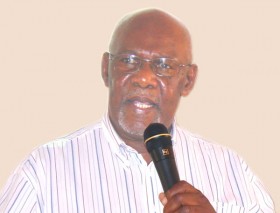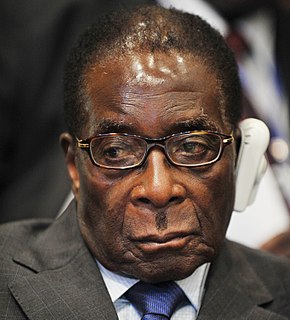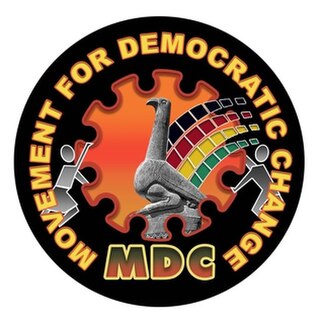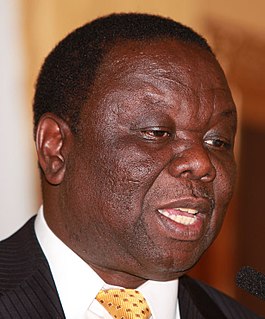
The Zimbabwe African National Union – Patriotic Front (ZANU–PF) is a political organisation which has been the ruling party of Zimbabwe since independence in 1980. The party was led for many years under Robert Mugabe, first as prime minister with the Zimbabwe African National Union (ZANU) and then as president from 1987 after the merger with the Zimbabwe African People's Union (ZAPU) and retaining the name ZANU–PF, until 2017, when he was removed as leader.

Arthur Guseni Oliver Mutambara is a Zimbabwean politician. He became the president of the Movement for Democratic Change (MDC) in February 2006. He has worked as a director and CEO of Africa Technology and Business Institute since September 2003. Under a September 2008 power-sharing agreement, Mutambara served in the government as one of two Deputy Prime Ministers from 2009 to 2013.

Dumiso Dabengwa was a Zimbabwean politician. He served as the head of Zimbabwe People's Revolutionary Army (ZIPRA) intelligence during the Rhodesian Bush War.
Sydney Tigere Sekeramayi is a Zimbabwean politician who served in the government of Zimbabwe as Minister of Defence between 2013 and 2017. He has been a minister in the Cabinet since independence in 1980, serving as Minister of Defence from 2001 to 2009 and Minister of State Security from 2009 to 2013.
Simbarashe Herbert Stanley Makoni is a Zimbabwean politician and was a candidate for the March 2008 presidential election against incumbent Robert Mugabe. He was Minister of Finance and Economic Development in President Robert Mugabe's cabinet from 2000 to 2002. He faced strong opposition during the Economic Change in Zimbabwe in the early 2000s as his policies contradicted those of the rest of the ZANU-PF party.
Obert Moses Mpofu is a Zimbabwean politician, who served as Minister of Home Affairs from 2017 to September 2018. Previously he was Minister of Macro-Economic Planning and Investment Promotion; Minister of Industry and International Trade; Minister of Mines and Mining Development; and Minister of Transport and Infrastructure Development. The Cabinet of Zimbabwe was later dissolved on 27 November 2017. He was reappointed as Minister of Home Affairs in Mnangagwa's first cabinet on 30 November 2017. The Culture portfolio was added to his ministry. Mpofu was later removed from the Zimbabwe cabinet in September 2018.

Kembo Dugish Campbell Mohadi, is a Zimbabwean politician and former Vice-President of Zimbabwe who served from 28 December 2017 to 1 March 2021. He briefly served as the Minister of Defence, Security and War Veterans in 2017. Previously he was Minister of State for National Security in the President's Office from 2015 to 2017 and Minister of Home Affairs from 2002 to 2015.
Webster Kotiwani Shamu is a Zimbabwean politician and former Minister of Mashonaland West Provincial Affairs fired by President Emmerson Mnangagwa on 21 May 2018. He previously served as Minister of Information and Publicity, and Minister of State for Policy Implementation. He is a member of parliament representing the Chegutu constituency. The Cabinet of Zimbabwe was later dissolved on 27 November 2017.
Campaigning for the first round of the presidential election held in Zimbabwe on 29 March 2008 took place from February to March. There were three major candidates: President Robert Mugabe of the ruling Zimbabwe African National Union - Patriotic Front (ZANU-PF), Morgan Tsvangirai of the opposition Movement for Democratic Change, and the independent candidate Simba Makoni.
This article gives details about the vote counting system for the 2008 Zimbabwe presidential election
Zambian President Levy Mwanawasa called an emergency meeting of SADC leaders for 12 April during the 2008 Zimbabwe presidential election to discuss the post-election impasse. According to Mwanawasa, Zimbabwe's "deepening problems" meant that the issue needed to be "dealt with at presidential level". Jacob Zuma, meanwhile, said that he thought results should have already been announced, and he described the failure to release them as "unprecedented".
The second round of voting in the Zimbabwean presidential election of 2008 was held between Robert Mugabe and Morgan Tsvangirai after the first round failed to produce a 50% majority for either candidate. The election process was marred by violence against and intimidation of voters and party workers, which eventually led to the withdrawal of Tsvangirai from the poll. This left Mugabe as the winner of, effectively, a one-candidate election.

The 2008–2009 Zimbabwean political negotiations between the opposition Movement for Democratic Change, its small splinter group, the Movement for Democratic Change – Mutambara, and the ruling Zimbabwe African National Union – Patriotic Front were intended to negotiate an end to the partisan violence and human rights violations in Zimbabwe and create a framework for a power-sharing executive government between the two parties. These negotiations followed the 2008 presidential election, in which Mugabe was controversially re-elected, as well as the 2008 parliamentary election, in which the MDC won a majority in the House of Assembly.

Before its split in 2005, the Movement for Democratic Change (MDC) was a Zimbabwean political party organised under the leadership of Morgan Tsvangirai. The MDC was formed in 1999 as an opposition party to President Robert Mugabe's Zimbabwe African National Union – Patriotic Front (Zanu-PF). The MDC was made up of many civic groups who campaigned for the "No" vote in the 2000 constitutional referendum, which would limit a president's service to two terms, before the introduction of a prime minister, as well as giving legal immunities to the State. However, as the term limit was not retroactive, Mugabe could still have maintained the presidency for two more terms. The most controversial part of the constitution was the land reform policies. It stated that, as in the Lancaster House Agreement, Britain would fund land reform from white settlers to landless black peasants. If Britain failed to compensate the farmers, the government would take the farms, without compensation. The party split over whether to contest the 2005 senate election, into the Movement for Democratic Change – Tsvangirai (MDC-T), the larger party led by Morgan Tsvangirai, and the Movement for Democratic Change – Ncube, a smaller faction then led by Arthur Mutambara and later led by Welshman Ncube. However, the two factions formed an electoral pact for the 2018 Zimbabwean general election called the MDC Alliance and re-united under the original name, the Movement for Democratic Change (MDC), in September 2018.

The Movement for Democratic Change – Tsvangirai (MDC–T) is a centre-left political party and was the main opposition party in the House of Assembly of Zimbabwe ahead of the 2018 elections. After the split of the original Movement for Democratic Change in 2005, the MDC–T remained the major opposition faction, while a smaller faction, the Movement for Democratic Change – Ncube, or MDC–N, was led by Welshman Ncube.

The Movement for Democratic Change – Ncube (MDC–N) was a Zimbabwean political party led by politician and attorney Welshman Ncube. It was founded in 2005 when the Movement for Democratic Change split apart and in the 2008 general election, it was known as the Movement for Democratic Change – Mutambara (MDC–M) in contrast to the larger Movement for Democratic Change – Tsvangirai (MDC–T). The MDC–N and the MDC–T operated as separate opposition parties until their re-unification in 2018. The re-united party now operates under the original name, the MDC.

Morgan Richard Tsvangirai was a Zimbabwean politician who was Prime Minister of Zimbabwe from 2009 to 2013. He was President of the Movement for Democratic Change, and later the Movement for Democratic Change – Tsvangirai (MDC–T), and a key figure in the opposition to former President Robert Mugabe.

General elections were held in Zimbabwe on 31 July 2013. Incumbent President Robert Mugabe was re-elected, whilst his ZANU–PF party won a two-thirds majority in the National Assembly.

General elections were held in Zimbabwe on 29 March 2008 to elect the President and Parliament. Because of Zimbabwe's dire economic situation, the elections were expected to provide incumbent President Robert Mugabe with his toughest electoral challenge to date. Mugabe's opponents were critical of the handling of the electoral process, and the government was accused of planning to rig the election. Human Rights Watch said that the election was likely to be "deeply flawed."

General elections were held in Zimbabwe on 30 July 2018 to elect the President and members of both houses of Parliament. Held eight months after the 2017 coup d'état, the election was the first since independence in which former President Robert Mugabe was not a candidate.












